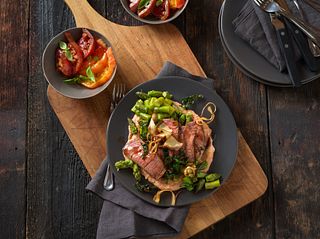Influencers Learn What It Takes To Raise Today's Veal
Donna Moenning, a facilitator of the Veal Quality Assurance Program, kicked off the VIP evening on September 18, introducing veal and how these cattle are raised to engage our influencers touching on the industry standards and the level of commitment to quality care by the farm families that raise them. To help tell that story, Mike Kunsman, a veal producer from La Jose, PA went through the day-to-day tasks on his farm, explaining all the care and dedication that goes into raising a quality and nutritious protein. Mike is a third-generation farmer and has been a grower for Marcho for the past 16 years.
Dr. Aydin, Dir. Research and Nutrition at Marcho Farms, Inc., and Robert Supanick, representative from Mountain States Rosen also joined the evening gathering, to provide insight on all aspects of the veal community. VIP evening attendees included five Registered Dietitians from Massachusetts, New Jersey and Pennsylvania, and three career chefs and culinary instructors from Pennsylvania.
The following day, our influencer group, along with students from the Culinary Institute of Philadelphia joined us for a tour of the Marcho Processing Plant, which began as a 2-person veal farm when founder Wayne Marcho purchased his first calf in 1969. Today, the Marcho family operates a fully-integrated veal and lamb manufacturing facility, providing premium veal cuts and products for families to enjoy nationwide and globally. Attendees toured the Marcho Feed Mill where precision and science are weaved together to create a balanced, milk-replacer formula, which all the veal growers feed to their calves. The tour then led influencers and students through the harvest floor, processing center and cutting rooms where veal products were cut down and packaged to be shipped to retail and foodservice establishments.
To the surprise of many attendees, the veal animals were a lot larger than expected, being upwards of 500 pounds at the time of harvest, helping to put into perspective how the veal landscape has changed over the year. Many were also excited to hear that all veal calves are now raised in group housing barns, a national initiative that was achieved in 2017.
Dr. Sonia Arnold, Manager of Nutrition, Research and Quality Control, and Chad Yoder, Calf Procurement, both of Marcho Farms, led the group through their facility. The day ended with a Veal Parmesan lunch and discussions on how veal is marketed by Anthony Tomassian, a Manufacturer Sales Representative for Marcho.
Throughout the experience, attendees were encouraged to ask questions and openly engage in dialogue with Marcho executives, veal growers and industry members. We are thankful for our veal community for opening their doors to showcase how today’s veal is raised today highlighting the improvements the industry has made through group housing and help dispel myths surrounding veal production!
Pre and post-tour survey results showed a forty percent attitudinal shift towards a positive favorability rating for beef with all participants citing they feel the positives of beef outweigh the negative. "I was amazed at how much care was taken at each stage of the veal process, from feeding the calves superior nutrition to housing and transporting them in a clean, safe and humane environment,” commented Kim Schwabanbauer. “This industry has come a long way and that is a story that demands to be told. The other real surprise was the sustainability aspect with the use of an animal that would otherwise be discarded. Every piece of the animal was used in a way that made sense for consumption or for the environment, right down to the heart linings being sent to St. Jude's Hospital for research. There was a lot of thought put into how to make everything work for the good of the order."
Attendees were encouraged to check out VealFarm.com and VealMadeEasy.com for more information, recipes, nutrition information and more.
This tour was made possible by the Pennsylvania Beef Council and the checkoff’s Northeast Beef Promotion Initiative, with funding support from the Kentucky Beef Council. To learn more about the Pennsylvania Beef Council, visit www.pabeef.org and for more information about your beef checkoff investment, visit MyBeefCheckoff.com.
# # #
The Beef Checkoff Program was established as part of the 1985 Farm Bill. The checkoff assesses $1 per head on the sale of live domestic and imported cattle, in addition to a comparable assessment on imported beef and beef products. States may retain up to 50 cents on the dollar and forward the other 50 cents per head to the Cattlemen’s Beef Promotion and Research Board, which administers the national checkoff program, subject to USDA approval.

Share This Page